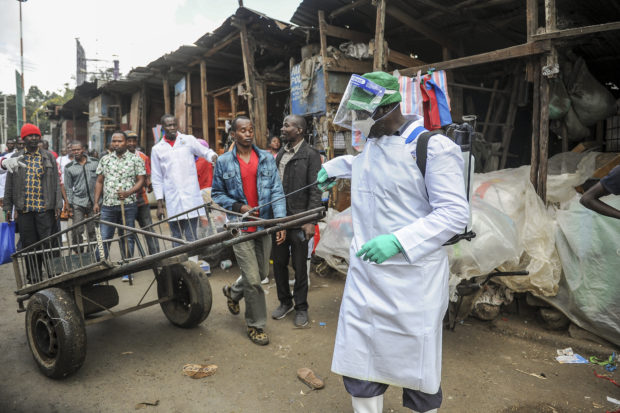Africa lockdowns begin as coronavirus cases above 1,000
ABUJA, Nigeria — Lockdowns have begun in Africa as coronavirus cases rise above 1,000, while Nigeria on Saturday announced it is closing airports to all incoming international flights for one month in the continent’s most populous country.

A Kenyan Health Ministry official sprays disinfectant onto a hand-cart to control the spread of the new coronavirus, in the Gikomba outdoor street market in the capital Nairobi, Kenya Saturday, March 21, 2020. For most people, the new coronavirus causes only mild or moderate symptoms such as fever and cough and the vast majority recover in 2-6 weeks but for some, especially older adults and people with existing health issues, the virus that causes COVID-19 can result in more severe illness, including pneumonia. (AP Photo/John Muchucha)
Rwanda said all unnecessary movements outside the home are banned for two weeks as of midnight except for essential services such as health care and shopping. The East African nation, which has 17 cases, told all public and private employees to work from home. Tunisia earlier imposed a lockdown as well.
Meanwhile, two African heads of state appeared to defy their own travel restrictions to attend another president’s inauguration.
Uganda, Eritrea and Angola announced their first cases, meaning 42 of Africa’s 54 countries are now affected. Congo and Ghana reported their first death; Burkina Faso reported two new ones.
Uganda is closing its borders to all but cargo. Ethiopia said all arriving passengers will face mandatory quarantine as of Monday. Republic of Congo and Ghana are closing their borders. But Somalia is lifting its ban on international flights for two days so stranded citizens can come home.
Nigeria’s international flight ban came a day after Africa’s busiest airport, in Johannesburg, blocked foreigners from disembarking and two major airlines — Ethiopian Airlines and South African Airways — announced sweeping cancellations of international flights.
Article continues after this advertisementNigeria’s announcement followed its first cases in the capital, Abuja.
Article continues after this advertisementThe Nigerian Civil Aviation Authority said “emergency and essential” flights are exempt from the ban that starts Monday. An adviser to President Muhammadu Buhari, Bashir Ahmad, said Nigeria also plans to suspend passenger rail services starting then.
While Angola closed air, land and sea borders this week, President Joao Lourenco attended Saturday’s inauguration of Namibian President Hage Geingob. Also there was President Mokgweetsi Masisi of Botswana, which this week suspended international travel by all government employees. Namibia has three cases.
“My conscience tells me … I did not give a bad example to Angolans,” Lourenco told state television, saying his earlier decree left room for extraordinary circumstances, the Portuguese news agency Lusa reported.
Zimbabwean President Emmerson Mnangagwa also was there. On Saturday, his country announced the first case in the capital, Harare.
Africa now has more than 1,100 cases, the Africa Centers for Disease Control and Prevention said.
Burkina Faso now has the most virus deaths of any country in sub-Saharan Africa and the most cases in West Africa with 64.
Several government ministers there have tested positive. On Friday, President Roch Marc Christian Kabore announced the country’s two international airports would close for two weeks with exceptions for military and cargo.
Burkina Faso is one of Africa’s most fragile states with a growing humanitarian crisis caused by attacks linked to Islamic extremists. More than 130 health centers have closed, the government and aid groups say.
According to a government response plan seen by The Associated Press, emergency teams aren’t trained for a respiratory disease outbreak and don’t have appropriate protective gear.
There’s also insufficient screening at borders. Of Burkina Faso’s 44 high-flow entry points, only 23% have coronavirus screening devices.
Jerry-Jonas Mbasha, cluster coordinator for the World Health Organization in Burkina Faso, said he was “much worried about what might happen in the next one week, two weeks from now.”
Most people only experience minor flu-like symptoms from the coronavirus and recover within a few weeks, but the virus is highly contagious and can be spread by those who appear well. It can cause severe illness, including pneumonia, in some patients, particularly those with underlying health problems.
More than 275,000 cases have been confirmed globally, including over 11,000 deaths, according to a running tally by Johns Hopkins University. At least 88,000 people have recovered.
In Nigeria, which just three weeks ago announced the first coronavirus case in sub-Saharan Africa, authorities said that first patient, a man who had traveled from Italy, was now fit to go home.
In Kenya, health officials disinfected crowded markets in the capital, Nairobi.
“It’s for the sake of us, it’s for the sake of the country,” said Simon Kimani, public health council chairman.
GSG
For more news about the novel coronavirus click here.
What you need to know about Coronavirus.
For more information on COVID-19, call the DOH Hotline: (02) 86517800 local 1149/1150.
The Inquirer Foundation supports our healthcare frontliners and is still accepting cash donations to be deposited at Banco de Oro (BDO) current account #007960018860 or donate through PayMaya using this link.